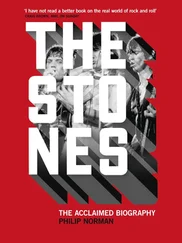Jack died from liver disease, probably caused by alcoholism, in 1921. Unable to survive on the state widow’s allowance of 5 shillings per child per week, Polly had no choice but to take in washing. It meant backbreaking, hand-scalding work from 4 a.m. to dusk, scrubbing other people’s soiled linen on a washboard, then squeezing out the sodden coils through a heavy iron mangle. Even so, as her granddaughter Joyce Lennon remembers, the cramped little house remained always spotless with ‘floors you could eat your dinner from’, the kitchen range cleaned with graphite religiously every Monday morning, the front step scoured almost white, then edged in red with a chip of sandstone. Polly ruled her five sons like Mrs Joe in Great Expectations , not hesitating to chastise them with a leather strap even when they were nearly grown men. Like many down-to-earth people, she had a contrasting mystical side, believing herself a psychic able to read the future in spread-out playing cards or the pattern of tea leaves in an empty cup.
As hard as Polly worked, the task of supporting her six-strong brood proved beyond her. Fortunately, a means was found to take Alf and Edith off her hands without breaking up the family or damaging her fierce self-respect. Both were offered live-in places at Liverpool’s Bluecoat Hospital (charity school) in Church Road, Wavertree, a stone’s throw from a then-obscure thoroughfare called Penny Lane. Founded in 1714, the Bluecoat still attired its male pupils in an 18thcentury costume of gold-buttoned blue tailcoat, breeches, stockings and cravat. The educational standard was high, the regime not unkindly, and any child granted admittance was considered fortunate. Alf and Edith, even so, found it traumatic to leave their cosy, soapy home in Copperfield Street and the mother they worshipped. Of the two, cheery Alf adjusted better to institution life: he did well at lessons, became mascot of the football team, and entertained his dormitory mates with the same song-and-dance and Charlie Chaplin skits he used to do for his family and neighbours.
From earliest childhood, his one wish had been to follow his father into show business. It very nearly came true one night when he was 14, and his brother Sydney took him to the Empire Theatre in Lime Street to see a troupe of singing, dancing juveniles called Will Murray’s Gang. After the show, Alf talked his way backstage and performed an impromptu audition for Will Murray, the Gang’s adult ringmaster, who there and then offered him a job. When his brothers Herbert and George, now in loco parentis , refused to entertain the idea, Alf ran away from the Bluecoat Hospital and joined up with the Gang en route to Glasgow for their next appearance. But a Bluecoat teacher came after him, led him back in disgrace and subjected him to ritual humiliation in front of his assembled schoolmates.
A year later, the Bluecoat sent him out into the world, equipped with a good education, plus two suits with long trousers to confirm his entry into manhood. He spent a few unhappy weeks as an office boy before realising that a far preferable career—one, indeed, almost comparable with going on the stage—lay right under his nose. For this was the golden age of transatlantic liner travel, when Liverpool vied with Southampton as Britain’s busiest passenger port. Huge, multi-funnelled ships daily nosed up the River Mersey to be met by emblazoned boat-trains from London, packed with rich people, their furs and cabin trunks. In Ranelagh Place, the splendiferous Adelphi Hotel had just been built to provide a painless transition from shore to ship, with its Titanic -size palm court, bedrooms like staterooms, below-waterline swimming pools, hairdressers and masseurs.
So Alf went off to sea as a bellboy on the SS Montrose . It was, as he soon discovered, a life he seemed born to lead. His friendly, cheery nature made him popular with passengers and his superior officers and kept him on the right side of the gay mafia who ran the ships’ catering departments. ‘Lennie’—his onboard nickname—rapidly won promotion to restaurant waiter on the cruise vessels plying between Liverpool and the Mediterranean. In off-duty hours, he would entertain his fellow workers with songs and impressions in their cramped, foetid communal cabins or in the crew bar, known on every ship as the Pig and Whistle. His speciality (one his father Jack would have especially appreciated) was blackening his face with shoe polish and ‘doing’ Al Jolson, the minstrel offcut whose schmaltzy anthems to ‘Mammy’ and ‘Dixie’ sold records by the million in the 1920s and early 30s.
He could think himself always in a kind of spotlight, whether serving rich food to ‘nobs’ in his gleaming white mess jacket and gloves, or crooning Jolson’s ‘Sonny Boy’, down on one knee, with clasped hands, to the beery delight of his shipmates, or returning home to Copperfield Street laden with the contraband ship’s delicacies that are every steward’s God-given perk. Between voyages, too, in some dockside saloon-bar or other, he could always find an audience eager to be regaled with stories about the exotic places and peoples he had seen and the racy shipboard life of a single young waiter.
Despite all his lurid sailor’s yarns, there had only ever seemed to be one woman for Alf Lennon. Sometime in 1928, not long after leaving the Bluecoat Hospital, he was strolling through Sefton Park resplendent in one of his two new suits, topped off by an outsized bowler hat and smoking a cheap Wild Woodbine cigarette fixed dandyishly into a holder. Seated alone on a bench beside the ornamental lake was a girl with fluffy auburn hair and the facial bone structure of a young Marlene Dietrich. When Alf moved in to chat her up, he was met with gales of derisive laughter. Realising that his top-heavy bowler was the cause, he whipped it off his head and sent it skimming into the lake. So began his long, troubled relationship with Julia Stanley.
In Julia—variously known as Juliet, Judy, or Ju—destiny had paired Alf with a character whose craving for glamour and urge to entertain were almost the equal of his. Julia, too, had a better than average singing voice and, unlike Alf, was a practised instrumentalist. Her grandfather, yet another stagestruck Liverpool clerk, had taught her to play the banjo; she also could give a passable account of herself on the piano accordion and the ukulele.
Julia’s musical talent, personality and enchanting prettiness made her an obvious candidate for the professional stage. But the hard slog entailed by a career on the boards was not for her. When she left school, aged 15, it was merely for an dull office job in a printing firm. She quickly gave this up to become an usherette at Liverpool’s plushest cinema, the Trocadero in Camden Street. Like Alf’s role at sea, it was a life of glamour by proxy, working amid deep pile carpets and soft lights, clad in a trim Ruritanian uniform with cross-buttoning tunic and pillbox hat.
Her looks won her many admirers, and even the manager of the Trocadero, a magnificent personage who wore evening dress all day, made periodic attempts to woo his prettiest usherette by leaving gifts of stockings or chocolates in her locker. For such a siren, Alf Lennon with his Chico Marx hat and little legs seemed not much of a catch. But their happy-go-lucky natures and zany sense of humour were exactly in tune. They also shared a passion for dancing—which in those days meant the ‘strict tempo’ ballroom variety. Waltzing or quickstepping in each other’s arms, they would imagine themselves the most famous dancing couple of the cinema screen, with redheaded Julia becoming Ginger Rogers while Alf metamorphosed into Fred, as in Astaire.
To outward appearances, Alf and Julia might seem to have been from roughly similar backgrounds. Both belonged to large families—she having as many sisters as he had brothers—and both were offspring of men in shipping. Like every other stratum of British life, however, the seafaring world in those days was governed by rigid class distinction. And it happened that Julia’s father, George Stanley, known to his family as Pop, stood several notches above Alf in the rigidly defined mercantile hierarchy. He had trained as a sailmaker in the not-so-distant days when many ships putting into Liverpool still relied on canvas as a supplement to steam. After many years at sea with the White Star Line, he had joined the London, Liverpool and Glasgow Tug Salvage Company, helping to retrieve the wrecks that storms or human error frequently caused in the treacherous deeps between the Mersey estuary and the North Wales shore.
Читать дальше












![John Bruce - The Lettsomian Lectures on Diseases and Disorders of the Heart and Arteries in Middle and Advanced Life [1900-1901]](/books/749387/john-bruce-the-lettsomian-lectures-on-diseases-and-disorders-of-the-heart-and-arteries-in-middle-and-advanced-life-1900-1901-thumb.webp)